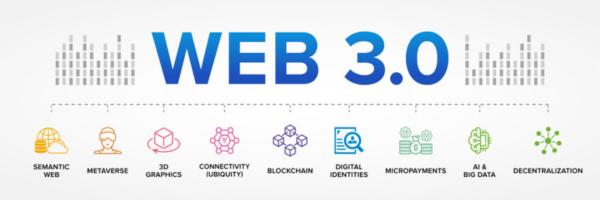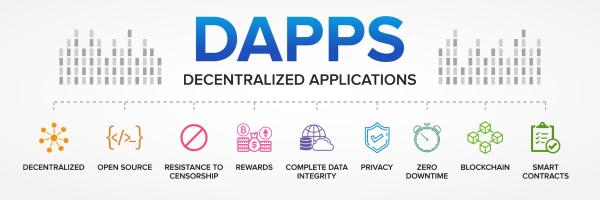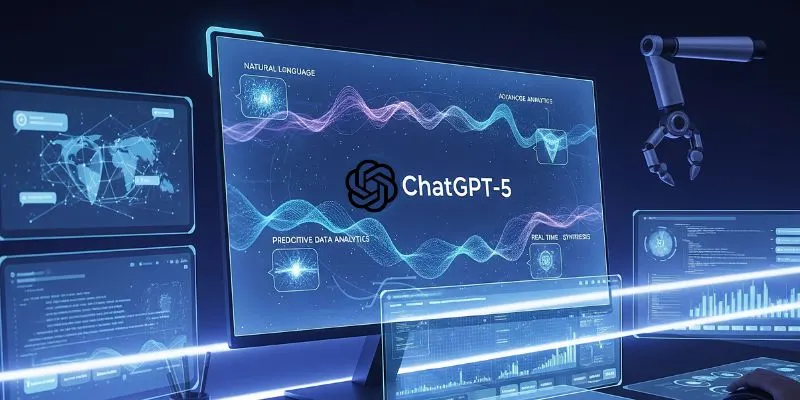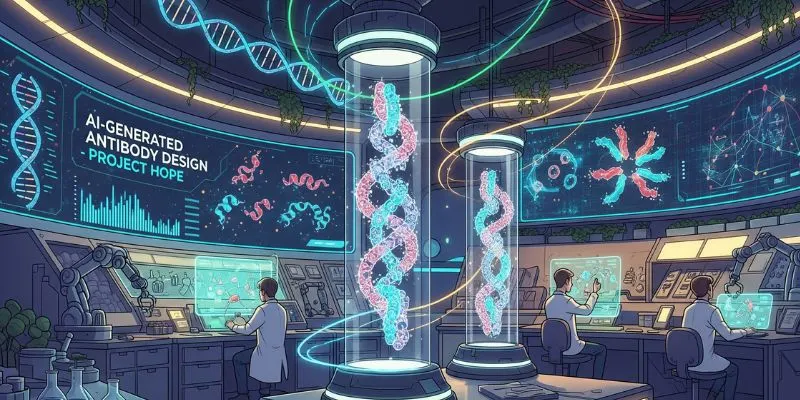By Ian Scarffe | Senior Contributor
The internet as we know is centralized. The flow of information and data is controlled by a few powerful companies, and users have little control over their personal information. But the emerging web3 and blockchain technologies have the power to alter all of that by establishing a decentralized internet.

Decentralized apps (dApps) may now be created using Web3 technologies and operate on a decentralized blockchain infrastructure. This infrastructure enables safe data storage and transfer, making web3 and blockchain crucial to the creation of a genuinely decentralized internet.
A decentralized internet would allow individuals greater control over their data and transactions and have the potential to completely transform sectors like banking, social media, and e-commerce.
For instance, in the financial sector, systems for decentralized financing (DeFi) based on blockchain technology are already allowing customers to access financial services without the need for middlemen like banks. Additionally, Decentralized systems like Steemit in the social media sector enable users to earn cryptocurrency through content creation and curation rather than depending solely on advertising income.
In this post, we’ll examine how web3 and blockchain technology may be used to build a decentralized internet and discuss how this technology could fundamentally alter how we use the internet.
The term “Web 3.0,” often referred to as the “decentralized web,” describes the next stage of internet development where individuals have complete control over their data and transactions. It was developed on top of Web 2.0, which made it possible to build interactive and dynamic websites by utilizing social media platforms and technologies like AJAX.
However, To build a more open and transparent internet, Web 3.0 takes things a step further by embracing decentralized technologies like peer-to-peer networks and blockchain. As a result, it is possible to develop decentralized apps (dApps) that utilize the decentralized architecture offered by blockchain technology.
These decentralized applications (dApps) may be created on different blockchain platforms like Ethereum, EOS, and TRON, giving users more control over their data and transactions and allowing them to connect to the internet directly and safely.
Blockchain is a distributed, decentralized digital ledger that keeps track of transactions on several computers. It is the technology that powers digital currencies like Bitcoin, but it also offers a wide range of other possible applications.
In essence, a blockchain is a chain of information-containing blocks. Each block has a reference to the block before it and a list of transactions. As a result, a chain of blocks is formed that is challenging to modify, keeping the data stored there safe and inaccessible.
Overall, the ability to securely and transparently store and transfer information without the use of middlemen is what makes blockchain technology so revolutionary across a range of businesses.
Web3 and blockchain technology have the potential to enable decentralized apps (dApps) and decentralized autonomous organizations (DAOs) to run on a peer-to-peer network without the need for a central authority.
As a result, individuals and enterprises may be more secure, private, and censorship-resistant, and there may be more opportunities for new kinds of economic activity and value creation. However, because it is a new and growing technology, it is difficult to forecast all of the ways it will be utilized and the influence it will have.
Dapps (Decentralized Applications) and DAOs (Decentralized Autonomous Organizations) are two key components of Web3 and blockchain technology that have the potential to change the way we interact with the internet forever.
Decentralized applications, or Dapps, are applications that run on a blockchain network instead of a single central server. This eliminates the need for centralized authority and enables peer-to-peer interaction between users and the program.

Dapps have a variety of applications, including social media, gaming, and financial services. Because Dapps are decentralized, users have complete control over their data and interactions, enhancing privacy and security.
DAOs, on the other hand, are decentralized organizations that operate on a blockchain network. They are run by smart contracts, which are self-executing contracts with the terms of the agreement written directly into the code. This eliminates the need for intermediaries, such as banks or legal firms. DAOs allow for a more transparent and efficient way of conducting business, as all transactions are recorded on a public ledger and can be viewed and verified by anyone.
Together, Dapps and DAOs have the power to challenge prevailing corporate paradigms and open up fresh avenues for innovation. For instance, Dapps and DAOs can enable peer-to-peer marketplaces, where buyers and sellers can communicate with each other directly without the use of middlemen, potentially lowering transaction costs and raising efficiency.
Web3 and blockchain technology have the potential to fundamentally change the way we interact with the internet. By enabling decentralized, peer-to-peer interactions, web3 and blockchain technology can eliminate the need for centralized intermediaries, such as internet service providers, social media platforms, and banks.
This can lead to a more open, transparent, and secure internet where individuals have more control over their data and interactions. Additionally, the use of smart contracts and decentralized autonomous organizations (DAOs) can enable more efficient, transparent, and secure ways of conducting business and managing assets online. This can potentially lead to new business models and revenue streams, as well as new opportunities for innovation and collaboration.
Furthermore, Blockchain and Web3 technologies have the potential to also transform how we use the internet in various ways including
Decentralized apps (dApps) and decentralized autonomous organizations (DAOs) can be built using Web3 and blockchain technology and run on a peer-to-peer network without the need for a central authority. This may result in greater security, privacy, and censorship resistance for individuals and companies.
Blockchain technology enables the creation of digital assets, or tokens, that may be used to symbolize ownership or access to a wide range of assets, including votes, real estate, and even digital art. This may open up new avenues for economic growth and value creation.
The development of smart contracts, which are self-executing contracts with the terms of the agreement between the buyer and seller directly put into lines of code, is another capability provided by blockchain technology. This may result in more automation and efficiency across many different industries.
Blockchain and Web3 technologies might be utilized to develop decentralized identification and reputation management systems, allowing for more private and secure online interactions.
Due to the openness of blockchain technology, all transactions can be recorded on a public ledger for anyone to examine and validate. It may be used to follow the flow of commodities through the supply chain in real-time in several different sectors, including supply chain management.
A distributed and decentralized digital ledger using blockchain technology keeps track of transactions on several computers. Since it is not governed by a single body, malicious actors would have a considerably harder time breaking into the system.
Overall, Web3 and blockchain technology have the power to completely transform how we engage with the internet by fostering a more open, transparent, and decentralized network where users have greater control over their data and interactions.
1. Finance – Blockchain technology could make it possible to establish decentralized financial institutions, facilitating quicker and less expensive transactions as well as the development of new types of financial instruments like stablecoins and security tokens. As a result, new types of economic activity may be possible and established financial institutions may be disrupted.
2. Social Media – Users may be able to own and control their data on decentralized social media platforms utilizing Web3 and blockchain technologies, as well as get compensated for their content production. As a result, users may have greater privacy and control, while content providers may find new ways to monetize their work.
3. E-commerce – Blockchain technology may make it possible to build decentralized markets that facilitate safer and more effective transactions. It may also make it possible to develop new types of digital assets, such as non-fungible tokens (NFTs) for digital collectibles and art.
Essentially, Web3 is an ambitious concept of a decentralized internet that enables users to communicate and transact with each other directly, without intermediaries. This revolutionary vision is made possible by blockchain technology, which creates a secure and transparent network that can be relied upon by all participants.
Web3 is the next generation of the internet, built on decentralization, transparency, and security principles. It offers many significant benefits over traditional web systems and is already being used in a range of exciting applications like Secretum, Decentraland, and Steemit.
Web3 and blockchain technology have the potential to revolutionize the way we interact with the internet. The decentralized nature of Web3 and blockchain technology enables users to have full control over their data and interactions, increasing privacy and security.
While the technology is still in its early stages and some challenges need to be addressed, the potential of Web3 and blockchain technology to create a decentralized internet makes it an exciting and rapidly developing field to watch.
Ian Scarffe is a serial entrepreneur, investor, key opinion leader and Blockchain consultant with business experience from around the world. An expert in Startup, Investment, Fintech, Web3 and Blockchain industries. Ian currently consults and advises for a range of multi-million dollar companies. Ian’s overall mission is to foster a society of economically independent individuals who are engaged citizens, contributing to the improvement of their communities across the world.

SpaceX aims to nearly double launches from Vandenberg in 2025, facing support from federal agencies but strong objections from the state and local communities.

OpenArt’s new “one-click story” compresses scripting, visuals, and edits into ready-to-post short videos—fueling viral growth and a fresh IP debate. We break down how it works, adoption signals, what’s next (multi-character, mobile), and practical guardrails creators and brands should follow to stay original and compliant.

OpenAI’s o3 swept the Kaggle AI chess tournament, defeating xAI’s Grok 4–0. The victory fueled the intense rivalry between Altman and Musk, reshaping AI benchmarks.

NASA and Google’s AI-powered Crew Medical Officer Digital Assistant enables autonomous diagnoses for astronauts on Mars missions, redefining remote healthcare for space and Earth.

Pinterest’s CEO confirms that fully agentic AI shopping is years away, as the platform invests in AI-powered tools to enhance discovery, inspiration, and personalized shopping experiences for millions.

Shopify’s new AI shopping tools are transforming e-commerce, letting agents and chatbots deliver smooth, personalized shopping and checkout experiences across platforms. Learn how these innovations reshape online retail.

Meta has acquired WaveForms AI, a startup pioneering emotion-detecting voice technology. Learn what this means for Meta’s AI voice ambitions and the future of AI audio.

Tracelight is revolutionizing financial modelling for finance professionals with AI-powered Excel tools that automate complex tasks, reduce errors, and unlock new analysis capabilities. Learn how this next-gen solution changes the future of spreadsheets.

China’s Lanyue lander completed its first major test, showcasing advanced engineering for safe, crewed moon landings before 2030. Explore how this milestone shapes the space race.

Microsoft rolls out GPT-5 across its Copilot suite, integrating smarter AI for enterprise and personal users. Discover new features, free access, and what sets this launch apart.

OpenAI’s GPT-5 is now live for all ChatGPT users. It brings faster, smarter AI with improved reasoning, expanded context, and safer outputs—marking a major leap in generative technology.

Chai Discovery’s $70M funding ushers in a new era for AI-powered antibody design, promising faster, more successful drug discoveries with its breakthrough Chai-2 model.
To provide the best experiences, we use technologies like cookies to store and/or access device information. Consenting to these technologies will allow us to process data such as browsing behavior or unique IDs on this site. Thanks for visiting futureTEKnow.